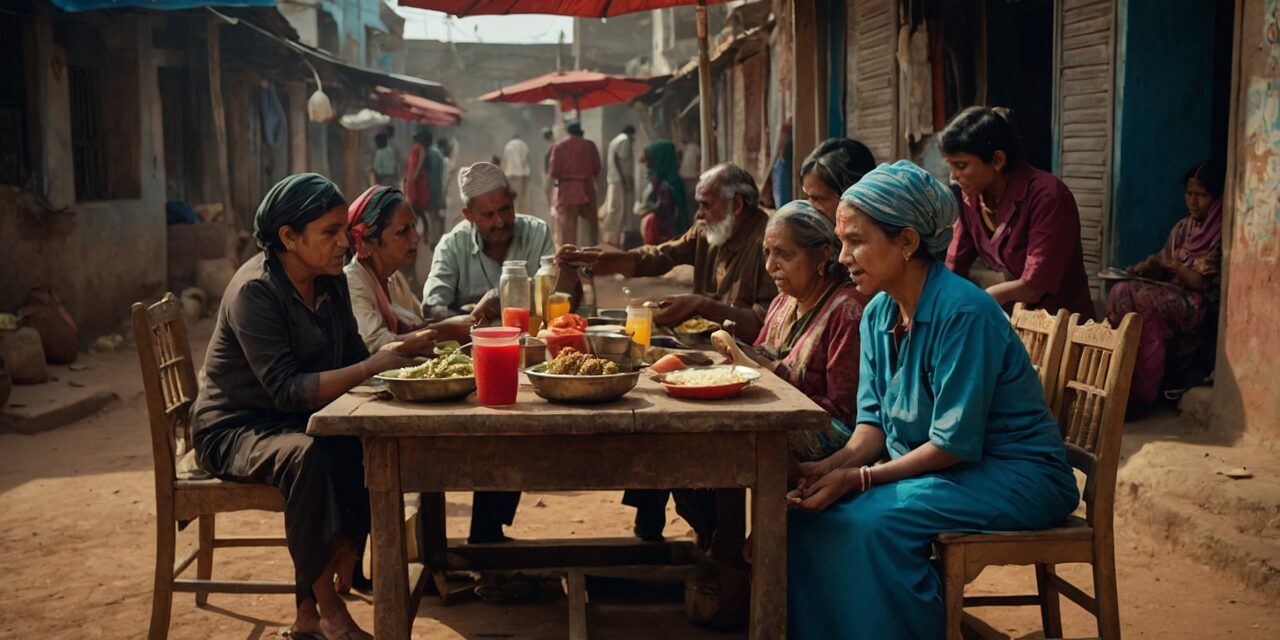Food is not just a basic human need for sustenance; it holds a significant role in society. It goes beyond mere nourishment and serves as a reflection of our social and cultural values. Food has the power to bring people together, create a sense of belonging, and preserve cultural heritage. In this article, we will explore the various ways in which food shapes society and influences our lives.
Key Takeaways
- Food is a reflection of culture and plays a significant role in shaping society.
- The evolution of cuisine and globalization have had a major impact on food culture.
- Food is closely tied to social identity, gender roles, and class divide.
- The impact of food on health and well-being cannot be ignored.
- Environmental sustainability is an important consideration in the power of food to shape society.
Food as a Reflection of Culture
Food is deeply intertwined with culture, and it reflects the values, beliefs, and traditions of a particular society. Different cultures have their unique culinary practices, ingredients, and cooking techniques that have been passed down through generations. For example, Indian cuisine is known for its vibrant spices and vegetarian dishes, reflecting the country’s rich cultural diversity and religious beliefs. Similarly, Italian cuisine is renowned for its emphasis on fresh ingredients and simple yet flavorful preparations, reflecting the Italian love for good food and family gatherings.
Food also plays a crucial role in preserving cultural heritage. Traditional recipes and cooking methods are often passed down from one generation to another, ensuring that cultural practices are not lost over time. In many communities, food is seen as a way to connect with one’s roots and maintain a sense of identity. By preserving traditional recipes and cooking techniques, communities can keep their cultural heritage alive.
The Evolution of Cuisine and its Impact on Society
Cuisine has evolved significantly over time due to various factors such as technological advancements, globalization, and changing societal norms. In the past, food was primarily prepared using basic cooking methods such as grilling or boiling. However, with the advent of new technologies like ovens, refrigerators, and blenders, cooking techniques have become more diverse and sophisticated.
Technological advancements have not only changed the way we cook but also impacted our food culture. The availability of processed foods and convenience products has made it easier for people to prepare meals quickly, but it has also led to a shift away from traditional cooking practices. Fast food and ready-to-eat meals have become increasingly popular, leading to concerns about the impact on health and the loss of traditional culinary knowledge.
The Influence of Globalization on Food Culture
Globalization has had a profound impact on food culture. It has facilitated the spread of culinary traditions across borders, allowing people to experience different cuisines from around the world. This exchange of food culture has enriched our culinary landscape and broadened our palates.
However, globalization has also raised concerns about cultural appropriation. As certain foods become trendy or popularized by mainstream media, they may be divorced from their cultural context and commercialized for profit. This can lead to the erasure of cultural significance and the exploitation of marginalized communities. It is essential to approach the adoption of different cuisines with respect and understanding, acknowledging their cultural roots and giving credit where it is due.
Food and Social Identity
Food plays a significant role in shaping individual and group identity. The foods we eat often reflect our cultural background, personal preferences, and values. For example, someone who identifies as vegan may choose to abstain from consuming animal products due to ethical or environmental reasons. On the other hand, certain foods may be associated with specific social groups or subcultures, creating a sense of belonging and shared identity.
Food can also be a powerful tool for building bridges between different communities. Sharing meals together can foster understanding, promote dialogue, and break down barriers. Food festivals and multicultural events often celebrate diversity through food, allowing people to experience different cuisines and learn about other cultures.
The Role of Food in Celebrations and Rituals
Food holds immense cultural significance in celebrations and rituals. It is often used to mark special occasions such as weddings, religious festivals, and holidays. Certain foods may have symbolic meanings or be prepared in specific ways to honor traditions and customs.
For example, in Chinese culture, dumplings are traditionally eaten during the Lunar New Year as they symbolize wealth and good fortune. In Jewish culture, challah bread is a staple during Shabbat dinners, representing the manna that sustained the Israelites during their journey in the desert. These foods not only provide nourishment but also connect people to their cultural heritage and create a sense of continuity.
Food and Gender Roles
Food is closely linked to gender roles and expectations in many societies. Historically, women have been primarily responsible for cooking and preparing meals, while men have often taken on roles related to hunting or farming. These gendered expectations have shaped our food culture and influenced the types of foods associated with masculinity or femininity.
However, it is important to recognize that these gender roles are not fixed or universal. In many societies today, there is a growing recognition of the need for gender equality in all aspects of life, including food preparation. Men are increasingly taking an active role in cooking and household chores, challenging traditional gender norms.
Food and Class Divide
Food is intricately linked to social class and can be a marker of privilege or disadvantage. Access to nutritious and culturally diverse food is not equal across all communities. Food insecurity, defined as limited or uncertain access to adequate food, disproportionately affects marginalized communities and those living in poverty.
The class divide is also evident in the types of foods consumed. Processed and unhealthy foods are often more affordable and readily available in low-income neighborhoods, leading to higher rates of diet-related diseases such as obesity and diabetes. On the other hand, fresh produce and organic foods are often more expensive, making them less accessible to those on a tight budget.
The Impact of Food on Health and Well-being
The food we consume has a direct impact on our physical and mental health. A balanced diet rich in fruits, vegetables, whole grains, and lean proteins is essential for maintaining optimal health. On the other hand, a diet high in processed foods, added sugars, and unhealthy fats can contribute to chronic diseases and poor well-being.
Food choices also play a role in mental health. Certain nutrients, such as omega-3 fatty acids found in fish, have been linked to improved mood and cognitive function. On the other hand, a diet high in sugar and processed foods has been associated with an increased risk of depression and anxiety.
Food and Environmental Sustainability
The production and consumption of food have a significant impact on the environment. Agriculture is a major contributor to greenhouse gas emissions, deforestation, and water pollution. The use of pesticides and fertilizers can also have detrimental effects on ecosystems and biodiversity.
Sustainable food practices aim to minimize these negative impacts by promoting environmentally friendly farming methods, reducing food waste, and supporting local food systems. This includes practices such as organic farming, regenerative agriculture, and promoting plant-based diets. By adopting sustainable food practices, we can help mitigate climate change and protect our natural resources.
The Power of Food in Shaping Society
Food is not just about sustenance; it is a powerful force that shapes society in numerous ways. It reflects our cultural heritage, preserves traditions, and connects us to our roots. Food has the ability to bring people together, create a sense of belonging, and foster understanding between different communities.
However, it is crucial to recognize the cultural impact of food and approach it with respect and sensitivity. Cultural appropriation and the exploitation of marginalized communities should be avoided. By embracing diverse culinary traditions, supporting sustainable food practices, and promoting equal access to nutritious food, we can harness the power of food to bring about positive social change.
FAQs
What is the cultural impact of food?
Food has a significant impact on culture and society. It is not just a source of sustenance but also a means of expressing cultural identity, social status, and religious beliefs. Food can bring people together and create a sense of community, or it can create divisions and reinforce social hierarchies.
How does cuisine shape society?
Cuisine plays a crucial role in shaping society by influencing people’s eating habits, social interactions, and cultural practices. It can also impact the economy, politics, and environment of a region. For example, the popularity of fast food in the United States has led to an increase in obesity rates and a decline in traditional cooking skills.
What are some examples of how food impacts culture?
Food impacts culture in many ways. For example, traditional dishes are often associated with specific regions or ethnic groups and can be a source of pride and identity. Food can also be used to celebrate religious holidays or mark important life events such as weddings and funerals. Additionally, the availability of certain foods can impact social and economic inequalities.
How does globalization impact food culture?
Globalization has had a significant impact on food culture by increasing the availability of diverse cuisines and ingredients from around the world. This has led to the fusion of different culinary traditions and the creation of new dishes. However, it has also led to the homogenization of food culture, with fast food chains and processed foods becoming more prevalent in many parts of the world.
What is food tourism?
Food tourism is a type of travel that focuses on experiencing local cuisine and food culture. It involves visiting restaurants, markets, and food festivals to sample traditional dishes and learn about the history and cultural significance of different foods. Food tourism has become increasingly popular in recent years, with many destinations promoting their local cuisine as a way to attract visitors.





